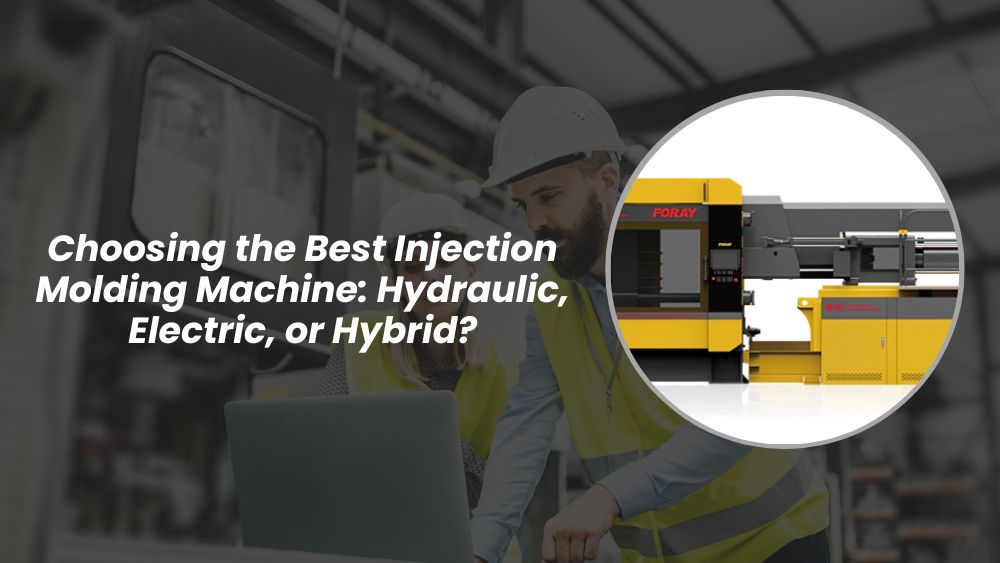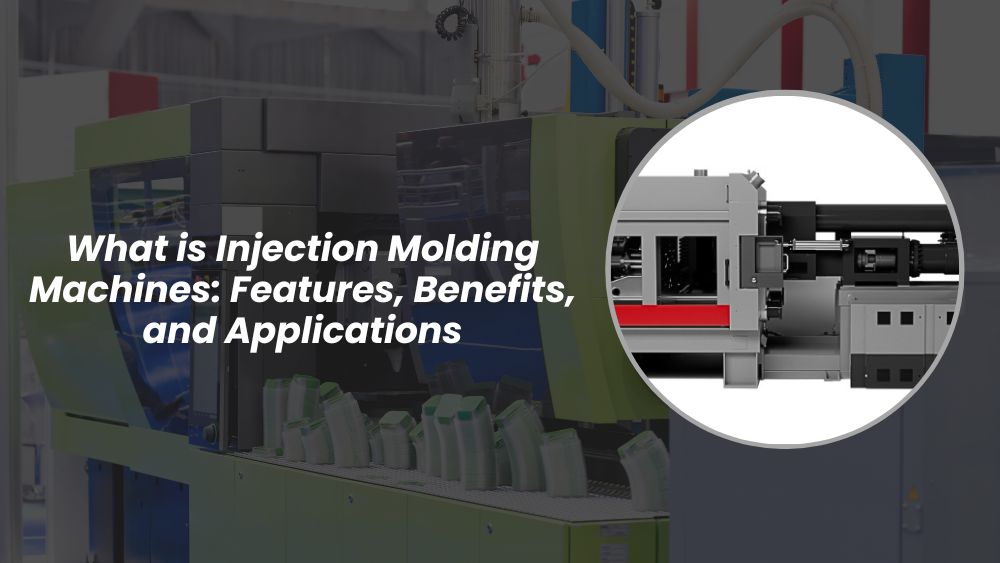_1736126665_WNo_1000d563.webp)
Selecting the right injection molding machine is a critical decision for any manufacturer. Whether you're focusing on high-volume production or precision engineering, the type of machine you choose can greatly impact your efficiency, cost, and product quality. With three main types—hydraulic, electric, and hybrid—each offering distinct advantages, it’s essential to understand how they differ and which one aligns best with your production needs. In this blog, we’ll explore the unique features of each machine to help you make an informed choice.
Table of Contents:
| Type of Injection Molding Machine | Key Features | Advantages | Disadvantages | Best For |
| Hydraulic Injection Molding Machine | Powered by hydraulic systems, uses fluid pressure for operation. |
- High clamping force - Reliable for large, complex molds - Well-suited for high-volume production |
- High energy consumption - Lower precision - Slower cycle times |
Large, less complex parts (e.g., automotive, industrial components) |
| Electric Injection Molding Machine | Powered by electric motors, offers precise control and fast cycle times. |
- Energy-efficient - High precision and accuracy - Faster cycle times |
- Higher initial cost - Limited clamping force - Higher maintenance costs |
Small-to-medium-sized parts requiring high precision (e.g., medical devices, electronics) |
| Hybrid Injection Molding Machine | Combines hydraulic power and electric precision for greater flexibility. |
- Energy-efficient - High precision - Faster cycle times - Versatile for different parts |
- Higher upfront cost - More complex maintenance |
Medium to large parts, versatile applications (e.g., packaging, automotive, consumer goods) |
Hydraulic injection molding machines are powered by hydraulic systems that use fluid pressure to operate. These machines have been the backbone of injection molding for years and are especially suited for high-volume production.
Advantages:
Disadvantages:
Best for:
Hydraulic injection molding machines are most effective for high-volume production of larger, less complex parts like automotive components, industrial products, and packaging materials.
Electric injection molding machines use electric motors to power the system, making them more energy-efficient and precise than hydraulic machines. These machines are increasingly popular for their speed and accuracy, especially in applications where precision is crucial.
Advantages:
Disadvantages:
Best for:
Electric injection molding machines excel in small-to-medium-sized parts that require high precision, such as medical devices, consumer electronics, and high-end consumer goods.
Hybrid injection molding machines combine the strengths of both hydraulic and electric systems, offering versatility and efficiency for a wide range of applications. These machines have gained popularity for their ability to balance high force with energy efficiency.
Advantages:
Disadvantages:
Best for:
Hybrid injection molding machines are best suited for manufacturers who need flexibility, producing both small-to-medium-sized parts and large, complex components. They are ideal for applications in industries like packaging, automotive, and consumer goods.
For high-volume production of bulky items, hydraulic machines are the go-to option due to their ability to exert high clamping force and run continuously. For more precise runs or low-volume production, electric machines provide the necessary control, while hybrid machines offer flexibility for medium-volume jobs.
If you're producing large, complex parts that need a significant amount of force, hydraulic machines are the best choice. For small, detailed parts that require high precision, electric machines are optimal. Hybrid machines are versatile enough to handle both types of production efficiently.
Electric injection molding machines are typically the most energy-efficient, making them an excellent long-term investment for companies focused on reducing operating costs. Hydraulic machines tend to consume more power, but they come with a lower initial investment. Hybrid machines strike a balance between energy efficiency and operational cost.
If precision is a priority, electric machines are your best bet. They excel in applications where even minor inaccuracies can lead to defects. Hybrid machines provide a balance of speed and force, making them ideal for businesses that require a combination of both.
Hydraulic machines are simpler and generally less costly to maintain but may have a shorter lifespan than electric or hybrid machines. However, electric machines may require more frequent maintenance due to their complex systems.
When it comes to purchasing a plastic injection molding machine, you have a variety of options depending on your needs, budget, and location. Whether you're a small manufacturer or a large enterprise, finding the right machine supplier is crucial for ensuring both the quality of the machine and ongoing support. Here are some key places where you can buy a hydraulic, electric, or hybrid injection molding machine:
OEM Manufacturers (Original Equipment Manufacturers)
Many injection molding machine manufacturers such as Husky Injection Molding Systems, KraussMaffei, Engel, and Sumitomo (SHI) Demag offer direct sales. Purchasing directly from the OEM ensures that you receive the latest models, warranty coverage, and post-purchase support. They typically provide both new and used machines depending on your budget.
Authorized Dealers and Distributors
Many regions have authorized dealers or distributors for leading brands. These distributors can help guide you through the purchase process, offer after-sales support, and even provide financing options. A quick search for local injection molding suppliers will help you find authorized dealers in your area.
Online Marketplaces
For businesses looking for cost-effective solutions, platforms such as Alibaba, Made-in-China, and Amazon offer both new and refurbished injection molding machines from a variety of manufacturers. While these platforms can provide competitive pricing, it’s important to thoroughly vet sellers and check reviews to ensure reliability.
Industrial Equipment Auctions
If you're open to buying used injection molding machines, industrial equipment auctions (both online and in-person) can be a great option. Websites like EquipNet, BidSpotter, and Ritchie Bros. Auctioneers feature used machines that can be acquired at a fraction of the cost of new models. However, buyers should exercise caution and inspect the machines thoroughly before purchasing.
Local Machinery Suppliers and Trade Shows
Many local machinery suppliers offer a range of plastic injection molding machines for different industries. Trade shows like K 2025 (Düsseldorf, Germany) and NPE (National Plastics Exposition) in the United States provide opportunities to see a wide range of machines in action and meet with suppliers directly. These events allow you to compare different brands, technology, and specifications in person.
Used Machinery Suppliers
For manufacturers with tight budgets, there are specialized suppliers that focus on used injection molding machines. Companies like PlastiWin Capital Equipment and MachinePoint sell high-quality pre-owned machines with warranties and service records, ensuring you still get good value for your investment.
1. What maintenance is required for injection molding machines?
2. Are electric injection molding machines suitable for small parts?
Yes, electric machines are ideal for producing small parts that require high precision. Their fast cycle times and precise control make them perfect for applications like medical devices or small electronic components.
3. Which type of injection molding machine is best for high-volume production?
Hydraulic injection molding machines are best suited for high-volume production because they can generate high clamping force and are ideal for large, heavy molds. They can run continuously and are more durable for large-scale manufacturing.
When choosing the best injection molding machine for your business, it’s essential to consider factors like production volume, precision, and cost-efficiency. Whether you choose a hydraulic, electric, or hybrid injection molding machine, each has its advantages depending on your needs. By assessing the specific demands of your production line, you can make an informed decision that improves both your manufacturing efficiency and product quality.
Ready to find the best injection molding solution for your production needs?
Contact us today for personalized advice on selecting the ideal machine to optimize your manufacturing process.
Recommended content:


















